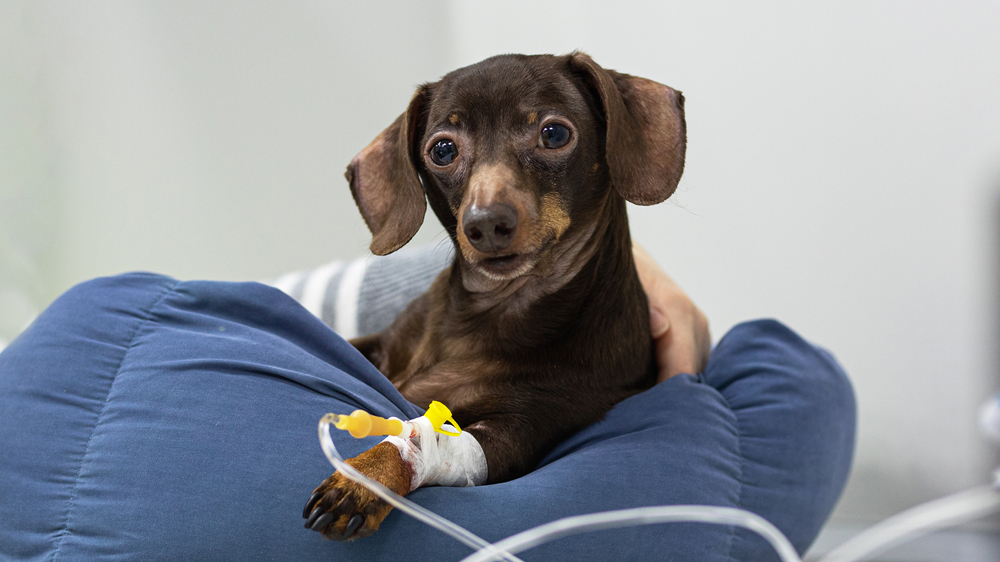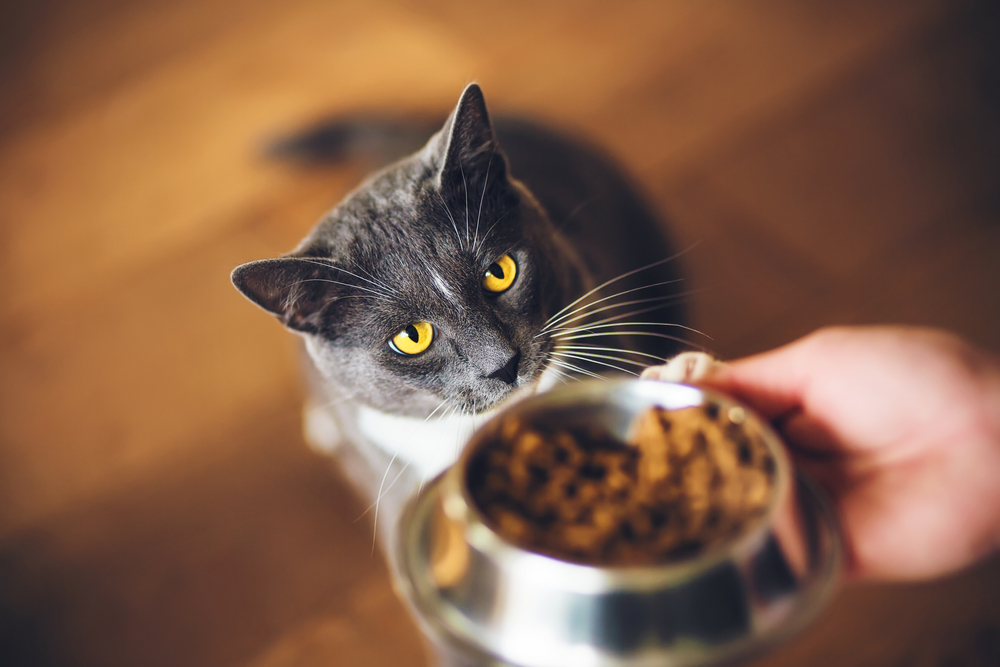Chronic kidney disease occurs commonly in middle-aged and older pets, but may also affect younger pets born with congenital problems. Kidney injuries can also occur in pets with serious infections, inflammatory conditions, or when blood flow becomes compromised, such as during anesthesia. The Groves Veterinary Clinic team believes early detection and dietary management are key to successful kidney disease treatment, so we’re sharing our knowledge about kidney disease and how diet and other treatments can affect your pet’s health.
Pet kidney functions
Dogs and cats have two kidneys located inside their abdomen that serve several important body functions, including:
- Filtering metabolic waste products from the blood
- Regulating water balance and hydration
- Regulating electrolyte, mineral, and protein levels
- Maintaining normal blood pressure
- Stimulating red blood cell production
Pet kidney disease signs
Pets with kidney disease usually do not show any signs until more than two-thirds of their kidney function is lost, and the body can no longer compensate. Pets do not feel well at this stage, because a cascade of events is occurring inside their bodies. Early stages may have milder signs than later, more severe stages. Kidney disease signs in dogs and cats may include:
- Weight loss
- Lethargy
- Increased thirst and urination, causing dilute urine
- Decreased appetite
- Nausea and vomiting
- Foul breath
- Dehydration
These signs occur because the kidneys can no longer filter the blood or conserve water properly. Pets who lose too much fluid and protein in their urine become dehydrated and lose weight, while waste products build up, and they feel sick. Also, their calcium and phosphorus balance is disrupted and their metabolism altered, and they may develop high blood pressure, anemia, and urinary tract infections or stones. Presence of kidney disease signs combined with blood work, urinalysis, and urine culture can diagnose kidney disease and associated complications.
Pet kidney disease causes
When older pets develop kidney disease, the cause is often unknown and attributed to aging. In younger pets, some kidney diseases, such as polycystic kidney disease, are inherited. Chronic kidney failure may also result after a sudden kidney insult, called acute kidney injury. Potential kidney disease causes include:
- Infections
- Autoimmune disease
- Tick-borne disease
- Cancer
- Vascular events (i.e., blood clots, stroke)
- Toxins
- Congenital or genetic diseases
- Decreased blood flow during anesthesia
How diet impacts kidney function in pets
Reducing the amount of certain dietary substances can also reduce the kidneys’ workload and improve or normalize mineral balance. Studies show that pets who consume renal diets live longer, have lower blood toxin levels, and often maintain weight better than pets who eat a regular diet. Because pets with kidney disease usually feel nauseous, most prescription veterinary diets are formulated in many extra-tasty options, so finding the one your pet likes best should not be difficult. A veterinary nutritionist-formulated diet is another good choice for pets who feel too sick or don’t like the commercial foods. In any case, proper nutrient balance is key to preserving remaining kidney function and helping your pet feel better. Key renal diet components include:
- Reduced protein — Moderately restricted protein reduces blood waste products and urinary protein loss, and helps prevent further kidney damage.
- Reduced phosphorus — High phosphorus levels from kidney disease lead to decreased blood calcium levels through hormonal dysregulation. Blood calcium has important electrolyte effects, and can affect bone health and heart rhythm. Many studies have proved that reducing dietary phosphorus significantly improves survival times.
- Increased omega-3 fatty acids — EPA and DHA fatty acids reduce inflammation and slow further kidney damage.
- Increased potassium — Potassium deficiency that occurs in kidney disease can result in serious heart problems, but can be offset by increased dietary levels. Some dogs have the opposite problem and may need a special, home-cooked diet instead of a commercial option.
If you choose a renal diet, you must commit to ensuring your pet is not fed any table scraps or treats that are not specially formulated. Renal diets are researched thoroughly and carefully balanced, and adding anything to your pet’s food can upset nutrient balance, render the diet ineffective, and reduce your pet’s disease control. Ensure you obtain veterinarian approval before adding food, treats, or supplements to your pet’s diet.
Other pet kidney disease treatments
Renal diets are only one facet of kidney disease treatment, and work best when combined with other strategies. Additional kidney disease treatments may include:
- Supplements to maintain mineral balance
- Hormone injections to counteract anemia
- Medications to treat high blood pressure and reduce protein loss
- Medications to reduce nausea and vomiting, and stimulate appetite
- At-home fluids given under the skin
- Enhanced water or water fountains to encourage fluid intake
- Hospitalization with IV fluids and medications for pets with acute illness
Pet kidney disease outlook

Pets with chronic kidney disease who are managed closely with diet and other treatments often live many months or years beyond their diagnosis. However, these pets must visit the veterinarian every few months for blood and urine tests, blood pressure monitoring, and weight monitoring, so therapy adjustments can be made, if necessary. They may experience acute illness bouts, which can be treated with a few days’ stay in the veterinary hospital. Some pets will eventually die from kidney disease, while others live many years and die from unrelated causes. The best way to help your pet with kidney disease is to follow your veterinarian’s nutritional and medical management recommendations.
Annual veterinary visits with wellness blood and urine testing can help our Groves Veterinary Clinic team detect kidney disease in the early stages and recommend an appropriate renal diet to prevent further damage. Contact us to schedule a wellness visit, or if you are concerned that your pet is showing kidney or other disease signs.







